Diplomatic Bluebook 2023
Special Feature
Russia's Aggression Against Ukraine and Japan's Response
2 Japan's Response
(1) Change in Policy toward Russia and Sanctions against Russia
Amid the drastically changing strategic environment in the Indo-Pacific region, Japan had been engaged in diplomacy with Russia based on the belief that building stable relations with Russia is extremely important not only for Japan's national interests but also for the stability and development of the region. However, with the start of Russia's aggression against Ukraine, it has become impossible for the international community to maintain relations with Russia as business as usual, and Japan has made a major shift in its conventional diplomacy toward Russia, taking resolute actions such as implementing severe sanctions against Russia in cooperation with the international community, including the G7.
On February 21, in response to Russia's recognition of the “Donetsk People's Republic” and the “Luhansk People's Republic” as “independent states” and ratification of treaties with both “republics”, Japan announced an import and export ban with both republics, an asset freeze against 24 relevant individuals, and a ban on the issuance and circulation in Japan of new sovereign bonds by the Russian government.
Furthermore, on February 24, in response to the start of Russia's military actions against Ukraine, Foreign Minister Hayashi summoned Russian Ambassador to Japan Mikhail Y. Galuzin, conveyed strong condemnation of Russia's aggression, and demanded that Russia immediately stop its aggression and withdraw its forces back to Russia. On February 25 the following day, in cooperation with the international community including the G7, Japan announced (a) asset freeze measures against six relevant Russian individuals, (b) asset freeze measures against three Russian financial institutions (Bank Rossiya, Promsvyazbank, and VEB.RF), and (c) sanctions on exports to Russian military-related entities (49 entities) and on exports to Russia of controlled items listed on the internationally agreed list as well as dual-use items such as semiconductors. On February 27, Japan also decided on measures such as freezing the assets of Russian government officials, including President Putin, and announced that it would participate in measures to exclude certain Russian banks from SWIFT2 based on requests from various Western countries.
Subsequently, Japan continued to closely cooperate with various countries, including the G7, to implement measures such as asset freezes against Russian government officials, military personnel, members of the State Duma, oligarchs, and others. Japan also implemented other financial measures such as asset freezes against banks including Russia's largest bank Sberbank, restrictions on transactions with the Russian central bank, responses to address use of digital assets to evade sanctions by Russia, a ban on new investment in Russia, and a ban on the provision of services to Russia (trust, accounting and auditing, and management consulting services).
In addition, trade measures included amending the Act on Temporary Measures concerning Customs and withdrawing Russia's most favored nation status. Furthermore, Japan implemented severe sanctions such as expanding the scope of measures to include a ban on exports to Russia of luxury goods, advanced goods, goods that contribute to the enhancement of industrial capabilities, and chemical weapons and other related goods as well as introducing a ban on the import of certain goods (machinery, some wood, vodka, etc.) and gold from Russia.
Besides the above economic sanctions, Japan has also suspended issuance of visas to Japan for some Russian individuals.
In response to these moves, on March 21, the Russian side issued a statement that it does not intend to continue negotiations on a peace treaty, suspends the Four-Island exchange program and free visits, and withdraws from the dialogue on the joint economic activities on the Four Northern Islands. On September 5, Russia issued a government decree suspending the validity of the agreement on the Four-Island exchange program and free visits. Furthermore, on May 4, the Russian side announced a ban on entry into Russia for 63 people, including Prime Minister Kishida, and on July 15, another ban was announced for 384 members of the House of Representatives.
Furthermore, on April 8, as a result of Japan's comprehensive judgment based on the situation of the aggression against Ukraine among others, Japan demanded the expulsion of eight diplomats of the Embassy of Russia and personnel of the Russian Trade Representation in Japan. In response, on April 27, the Russian side demanded the expulsion of eight diplomats of the Embassy of Japan in Russia.
With regard to the series of measures taken by the Russian side against Japan, it is absolutely unacceptable that the Russian side is making extremely unjustified claims as if to shift the responsibility to the Japanese side, despite the fact that it was the Russian side that resorted to military means to conduct aggression against Ukraine and caused the current situation. The Government of Japan has communicated this to the Russian side and has strongly protested.
As for measures in the energy field, the Government of Japan's policy is to phase out dependence on Russian energy, including coal and oil, and will take steps over time to do so in a manner that minimizes adverse effects on people's lives and business activities. Meanwhile, it is Japan's policy to maintain our interests in the oil and natural gas development projects “Sakhalin-1” and “Sakhalin-2” in Russia, as these projects are important for Japan's energy security from the perspective of ensuring stable supply over the medium to long term. Furthermore, the G7 and Australia, together with the EU, have introduced a price cap on Russian oil and oil products with the aim of stabilizing international oil prices while reducing Russia's revenue from energy.
- 2 Overview of the Society for Worldwide Interbank Financial Telecommunication (SWIFT):
・An association (cooperative) that serves as an intermediary and executor of financial transactions between banks around the world. Headquartered in Belgium.
・More than 11,000 banks and other financial institutions in more than 200 countries are connected to it, sending an average of more than 42 million messages related to international financial transactions per day.
・The association was established under Belgian law and is subject to the EU regulatory framework.
(2) Assistance to Ukraine
Since the beginning of Russia's aggression against Ukraine, Japan has promptly provided Ukraine with assistance in close contact with the Ukrainian people while accurately grasping local needs, ranging from financial, humanitarian, and defense equipment assistance to the acceptance of displaced persons. Specifically, Japan has been providing approximately 1.6 billion US dollars in financial, humanitarian, food, and recovery and reconstruction assistance to Ukraine, neighboring countries, and others.
In order to once again show solidarity with Ukraine upon marking one year since the start of Russia's aggression, Japan decided to provide additional financial assistance of approximately 5.5 billion US dollars, subject to the passage of the relevant budget and laws by the Diet. Furthermore, on March 21, 2023 at the Japan-Ukraine Summit Meeting3 in Kiev, Prime Minister Kishida, who was visiting Ukraine, stated that Japan would steadily implement the total of 7.1 billion US dollars in assistance, and support Ukraine in various fields including electricity, mine clearance, and agriculture. Prime Minister Kishida also stated that the Government of Japan had recently decided to provide the assistance including new bilateral grant aid amounting to 470 million US dollars to various areas including the energy sector, and to contribute to support non-lethal defense equipment assistance amounting to 30 million US dollars through the NATO trust fund.
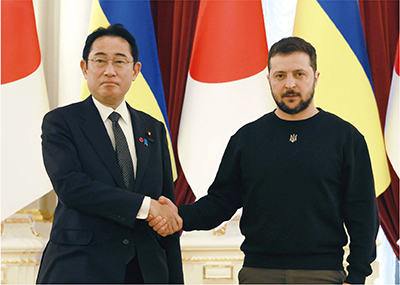 Welcome ceremony on the occasion of the Japan-Ukraine Summit Meeting (March 21, 2023, Kyiv, Ukraine; Photo: Cabinet Public Affairs Office)
Welcome ceremony on the occasion of the Japan-Ukraine Summit Meeting (March 21, 2023, Kyiv, Ukraine; Photo: Cabinet Public Affairs Office)- 3 For more information on the March 21, 2023 Japan-Ukraine Summit Meeting,
see the Ministry of Foreign Affairs' website: https://www.mofa.go.jp/erp/c_see/ua/page4e_001361.html
A Financial Assistance
Prime Minister Kishida announced to President Zelenskyy of Ukraine at the Japan-Ukraine Summit Telephone Talk on February 15 that Japan was prepared to urgently provide assistance through loans. He also announced at the G7 Leaders' Meeting on March 24 that Japan would provide 100 million US dollars in emergency financial assistance through co-financing with the World Bank. Following this, at the April 19 Summit-Level Video Conference on the Situation in Ukraine, Japan announced the increase of its financial assistance from 100 million US dollars to 300 million US dollars, and a further doubling of the total to 600 million US dollars on May 20. In order to meet Ukraine's urgent and short-term financial requests as it faces an economic crisis, Japan encouraged the Government of Ukraine to advance the procedures quickly. Japan signed exchanges of notes in Tokyo with the Ukrainian side for loan aid on April 28 for the 100 million US dollars (13 billion Japanese yen) that was initially announced, and on June 7 for the additional provision of 500 million US dollars (65 billion Japanese yen).
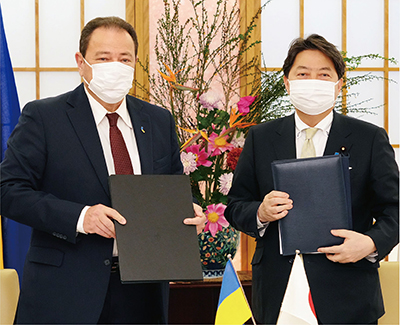 Signing ceremony for the exchange of notes on financial assistance (April 28, Tokyo)
Signing ceremony for the exchange of notes on financial assistance (April 28, Tokyo)This financial assistance is used to maintain and continue essential public services by the Government of Ukraine and to promote economic reforms and capacity building of government officials. This is expected to underpin the economy of Ukraine, which is facing an economic crisis due to Russia's aggression.
Furthermore, on January 16, 2023, Japan, as a member of the Group of Creditors of Ukraine, supported Ukraine's request to defer debt payments due to bondholders, and signed and exchanged notes concerning debt relief (debt service suspension) for Ukraine with the aim of encouraging bondholders to agree to this request.
Furthermore, at the G7 Finance Ministers and Central Bank Governors' Meeting and the G7 Leaders' Video Conference in February 2023, Japan announced additional financial assistance of approximately 5.5 billion US dollars to address Ukraine's financial gap, which has become a major challenge, on the condition of passage of the relevant budget and laws by the Diet.
B Humanitarian Assistance
In response to Russia's aggression against Ukraine, on February 27, Japan announced, ahead of other countries, 100 million US dollars in emergency humanitarian assistance to Ukraine and neighboring countries. Through international organizations and Japanese NGOs, Japan has been conducting activities in the most urgent fields, including health and medical care, and food. Furthermore, given that many of the displaced persons are women and children, Japan has also provided assistance that takes into consideration the needs of women and children.
One example is Japan's assistance provided through the United Nations Children's Fund (UNICEF) and the UN High Commissioner for Refugees (UNHCR) to “Blue Dot” Hubs that offer safe spaces to support displaced Ukrainian children and their families. Furthermore, through the UNHCR and the International Organization for Migration (IOM), Japan also provides temporary evacuation facilities where women and children can safely take shelter, and is working to prevent sexual and gender-based violence. Japan has also provided support for the provision of hot meals through the UN World Food Programme (WFP).
On March 24, Japan announced an additional 100 million US dollars in emergency humanitarian assistance in light of further humanitarian needs. Specifically, in addition to assistance related to capacity building for human trafficking countermeasures, including for border control authorities and others in Ukraine and neighboring countries, Japan will contribute to ensuring the safe movement of displaced persons through humanitarian activities, including the disposal and handling of landmines and unexploded ordnance in connection with emergency debris clearance. Japan also extended assistance to Moldova, which is accepting the largest number of displaced persons compared to its population.
On April 1, the Government of Japan made a Cabinet decision to provide UNHCR with blankets, plastic sheets, and sleeping mats stockpiled in the Government's warehouse in accordance with the International Peace Cooperation Act. These items were transferred to UNHCR on April 19. On April 28, the Government of Japan made another Cabinet decision on the “Implementation Plan for the International Peace Cooperation Assignments for Afflicted People of Ukraine” based on the aforementioned Act. Following the Plan, the Government of Japan transported UNHCR's humanitarian relief items from Dubai (the United Arab Emirates) to Poland or Romania using Self-Defense Force (SDF) aircraft eight times from May 1 to June 26.
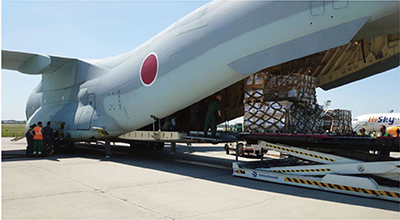 SDF aircraft transporting humanitarian relief supplies for UNHCR. The transported supplies were delivered to displaced people via UNHCR (May 13, Romania; Photo: Ministry of Defense website)
SDF aircraft transporting humanitarian relief supplies for UNHCR. The transported supplies were delivered to displaced people via UNHCR (May 13, Romania; Photo: Ministry of Defense website)Furthermore, as Ukraine is one of the world's leading agricultural countries but Russia's aggression has made it difficult to plant crops on farmland, Japan distributed seeds and fertilizers for grain production through the Food and Agriculture Organization of the United Nations (FAO) to help restore agricultural production in Ukraine at an early stage and contribute to ensuring food security not only in Ukraine but also around the world. (See 4(1) for details on Japan's support to contribute to ensuring global food security.)
Following this, many energy and infrastructure facilities were destroyed by Russian attacks. As the winter got colder and the days got shorter every day, Japan decided on November 22 to implement winterization assistance by providing generators and solar lanterns through UNHCR to people who were unable to use heating and lighting equipment due to power outages. Since December, Japan has also provided generators through the Japan International Cooperation Agency (JICA), and has provided approximately 300 generators thus far. Furthermore, in February 2023, Japan decided to implement additional winterization assistance with provision of reflective materials and heat packs to the National Police of Ukraine through the UN Office for Project Services (UNOPS).
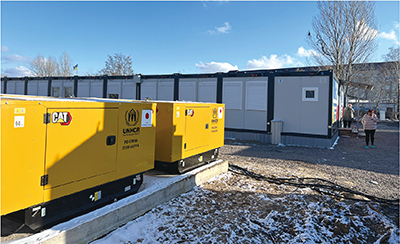 Generators provided by Japan installed near temporary housing (© UNHCR)
Generators provided by Japan installed near temporary housing (© UNHCR)C Provision of Defense Equipment and Other Supplies
It is extremely important for the international community to unite in a resolute response to Russia's aggression against Ukraine, an act that shakes the very foundation of the international order, not only in Europe but also in Asia, in order to protect the rules-based international order, and from the perspective of Japan's security.
From this perspective, in response to Ukraine's request for the provision of defense equipment and other goods, Japan partially revised the implementation guidelines for the Three Principles on Transfer of Defense Equipment and Technology at the National Security Council meeting on March 8, in order to provide non-lethal equipment in accordance with the Self-Defense Forces Act within the scope of the Three Principles on Transfer of Defense Equipment and Technology. Since that month, Japan has used SDF aircraft and other means to transport and provide bulletproof vests, helmets, winter battle dress uniform, medical supply, protective masks and clothing for use against chemical weapons and the like, small drones, and civilian vehicles (vans).
In this context, on March 8, Foreign Minister Hayashi and Ukrainian Ambassador to Japan Sergiy Korsunsky signed and exchanged notes, which took effect on the same day, as an international agreement required under the Self-Defense Forces Act as well as the Three Principles on Transfer of Defense Equipment and Technology for the transfer of equipment and goods stipulated in the Self-Defense Forces Act. This note ensured appropriate control of the equipment and goods after the transfer to Ukraine by stipulating such provisions as prohibition of extra-purpose use of the transferred equipment and goods.
D Acceptance of Displaced Persons
In response to the displaced persons from Ukraine, which has been described as the largest refugee crisis in Europe since World War II (statement by UN High Commissioner for Refugees Filippo Grandi), Japan has been proactively conducting efforts to accept displaced persons. On March 2, soon after Russia's aggression began, Prime Minister Kishida announced the intention to promote the acceptance of Ukrainian displaced persons, and on March 16, he established the Liaison and Coordination Council on Measures for Ukrainian Displaced Persons as a command post. On March 18, the Council decided to provide assistance for the acceptance of Ukrainian people who have been forced to flee Ukraine and wish to evacuate to Japan. On March 25, the Embassy of Japan in Poland and the Rzeszów liaison office were strengthened and the “Ukrainian Displaced Persons Support Teams“ were established to study and grasp the needs of the displaced persons for travel assistance to Japan.
Furthermore, in early April, Foreign Minister Hayashi and State Minister of Justice TSUSHIMA Jun visited Poland, where they met with Polish government officials, inspected facilities for displaced persons, and visited the Ukrainian border region to confirm the situation of displaced persons in Ukraine, as well as the needs and challenges for accepting them. When Foreign Minister Hayashi returned to Japan, a reserve government airplane also transported 20 displaced persons who were eagerly seeking to evacuate to Japan but had difficulty in securing means of travel on their own.
Moreover, in order to facilitate smooth travel to Japan, from April 8 to now (the end of February 2023), the Government of Japan has been securing seats on weekly direct flights to Poland for Ukrainian displaced persons who eagerly wish to evacuate to Japan but have difficulty in securing means of travel on their own, providing travel assistance from a humanitarian perspective. The Government plans to continue to support travel to Japan for the time being.
In accepting displaced persons, it is important to first of all provide places where Ukrainian displaced persons can evacuate to with peace of mind. Japan will continue to provide support for Ukrainian people facing difficulties in cooperation with relevant ministries and agencies.
E Support for Recovery
While the outlook for the situation remains uncertain, the international community is also moving toward the recovery of Ukraine.
On July 4 and 5, the Ukraine Recovery Conference was held in Lugano, Switzerland. State Minister for Foreign Affairs SUZUKI Takako attended the Conference from the Government of Japan. She emphasized Japan's intention to actively contribute to Ukraine's recovery while leveraging its experience in recovering from various natural disasters and the like. She also expressed the expectation that Ukraine's recovery plan will give the Ukrainian people hope for a bright future. As an outcome of the Conference, the “Lugano Declaration“ was issued, which outlines the guiding principles for Ukraine's recovery as confirmed by the participating countries and institutions.
On October 25, the International Expert Conference on the Recovery, Reconstruction and Modernisation of Ukraine was held in Berlin. Prime Minister Kishida participated in the Conference by sending a video message. He stated that the recovery of Ukraine must firstly be based on Ukrainian ownership of the process. Secondly, all countries, institutions, and companies engaged in assistance must share the overall picture of recovery. And thirdly, they must operate in a transparent and fair manner in line with international rules and standards. Moreover, recovery requires a framework that will enable it to gain the support of the broader international community, including the EU and the countries participating in the Conference. He also stated that Japan, as it would assume the G7 Presidency in 2023, intended to actively lead the international community's discussions toward the speedy restoration of peace and recovery in Ukraine.
On December 13, the International Conference in Support of Ukraine's Civil Resilience was held in Paris, and was attended by Parliamentary Vice-Minister for Foreign Affairs YOSHIKAWA Yuumi. She introduced the approval of the supplementary budget, including the budget for Ukraine and its neighboring countries, and expressed that Japan will provide necessary humanitarian assistance as well as recovery and reconstruction assistance, focusing on urgent humanitarian assistance and recovery of the daily lives of Ukrainian people, along with energy-related fields such as generators. She also stated that as Japan assumed the G7 Presidency in 2023, it would actively provide support tailored to the people of Ukraine in close cooperation with the international community, including the G7, and leverage the knowledge and experience that Japan has accumulated in the recovery of other countries.
For the reconstruction of Ukraine, while taking into account the discussions at the above conferences, it is important to enable the Ukrainian people to envision their short-, medium-, and long-term future under Ukraine's own ownership and with strong support from the international community. It is also essential that all countries, institutions, and companies engaged in assistance share the overall picture of recovery and that activities are carried out in a transparent and fair manner in accordance with international rules and standards. Japan will consider and implement reconstruction assistance in close contact with the Ukrainian people, while accurately grasping local needs and making use of the knowledge and experience it has accumulated to date.
As a specific example, in January 2023, in cooperation with Cambodia, where Japan has been supporting mine and unexploded ordnance clearance efforts for more than 20 years, Japan conducted drills and training for Ukrainian government officials in the use of mine detection equipment that Japan plans to provide to Ukraine. In February, Japan provided broadcasting equipment through JICA to the Public Broadcasting Company of Ukraine (PBC), in order to contribute to strengthening Ukraine's democracy through the establishment of an accurate and impartial reporting system. The Government of Japan has been supporting PBC since 2017 in establishing a reporting system for disasters and emergencies, strengthening its TV-program production capacity, and enhancing its ability to operate and maintain its broadcasting equipment.
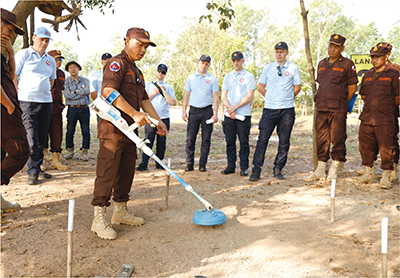 Cambodian Mine Action Center experts training members of the State Emergency Service of Ukraine in the use of mine detectors (January 17, 2023, Kampong Chhnang, Cambodia; Photo: JICA)
Cambodian Mine Action Center experts training members of the State Emergency Service of Ukraine in the use of mine detectors (January 17, 2023, Kampong Chhnang, Cambodia; Photo: JICA)As the G7 Presidency in 2023, Japan will actively lead the international community's discussions toward the restoration of peace and recovery as soon as possible.
